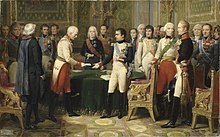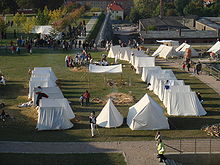Congress of Erfurt
This article needs additional citations for verification. (January 2018) |
| Congress of Erfurt Fürstenkongress Erfurt (German) | |
|---|---|
 | |
| Host country | First French Empire |
| Date | 27 September – 14 October 1808 |
| Venue(s) | Kurmainzische Statthalterei, Principality of Erfurt |
| Participants |
|
| Follows | Treaties of Tilsit |
The Congress of Erfurt was the meeting between
Background
At Tilsit, Napoleon had made an admirer of Alexander, but by the time of the meeting at
Conference

The city of Erfurt was under the direct control of the Emperor of the French at this time as the
Out of the meetings came an agreement, the Erfurt Convention, in fourteen articles, calling upon Britain to cease its war against France, recognizing the Russian conquest of
By 1812 Russia no longer complied with Napoleon's Continental System of economic warfare against the United Kingdom and anti-French sentiment in the Russian court had reached a new height. Russian defence spending had increased and troops were deployed to the border in preparation for an invasion of Poland. Napoleon pre-empted this by attacking first and with greater force.
From the beginning at Tilsit few onlookers believed these two European powers could peacefully exist side by side, with the Grand Duchy of Warsaw a French satellite state neighbouring Russia. Erfurt may have delayed the eventual outbreak of war, but it was likely the two powers would ultimately come into conflict.[citation needed]
In popular culture
The congress is an event referred to by Leo Tolstoy in his War and Peace (Book Two Part Three Chapter 1).[2]: 240, 246
